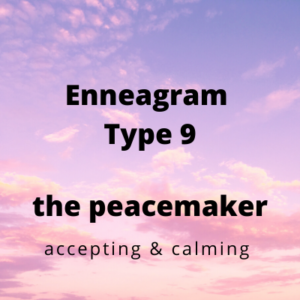Enneagram Type 9: The Peacemaker
The Enneagram is one of the many personality tests that explains how people conceptualize the world and deal with their emotions. It has nine different personality types that are mapped on a nine-point scale to see how each type relates to the other. So let’s discuss this enneagram type 9 personality
The word Enneagram is derived from two Greek words Ennea meaning nine and Gramma meaning drawn or written.
Through this method, you can now understand why a person behaves a certain way. Moreover, since it can describe how a person might react in some situations, the Enneagram also offers an opportunity for self-improvement.
Did you get an Enneagram Type 9 result on your personality test? If yes, continue reading this post to know what this type really means!
Enneagram Type 9: Defining traits
When describing this Enneagram type, the nickname that comes to mind is ‘The Peacemaker’. Here’s a list of some of their main characteristics:
- Accepting and calming
- Settles conflicts easily
- Has a ‘quietening down’ presence
- Has a soothing and relaxing voice
- Popular among colleagues
- Likeable
- Moves slowly yet gracefully
What are they like?
Peacemakers are gentle and agreeable and often mediators in their social groups. They’d rather work behind the scenes, too, to maintain harmony within the group.
As kids, they got along well with almost anyone. They can hear both sides of a story and see the different sides of an issue before making a conclusion.
Humble and gentle, Peacemakers are willing to compensate just to avoid rocking the boat. They’re also appreciative of the simple joys in life and the smallest things others do.
Their core values
Unity, kindness, and peace – these are what fuel a Peacemaker’s actions. They wish to be the glue that holds everyone together, whether it’s in their friend or family circle.
Recognizing their work and reminding them of their value is the best way to a Peacemaker’s heart. They believe in the power of forgiveness and acceptance and share pieces of advice to maintain peace and serenity.
Peacemakers aim to be balanced both in and out. Therefore, they try to apply this persona in all aspects of their lives.
How to recognize an enneagram type 9?
Peacemakers are considered as chameleons who can easily adapt to a group and help others get along.
They’re soft-spoken and fun to be around, too and know how to include people in conversation. Peacemakers are very cooperative and always encourage others to state their opinions.
They’re firm when it comes to their decisions and try to neutralize tension to restore peace and order. They’re willing to tolerate anyone and retain their self-esteem by being helpful and kind.
Also, Peacemakers enjoy the comfortable side of life and may distance themselves from time to time to recharge. They use this alone time to seek deeper meaning with the universe.
Enneagram Type 9: What they’re like at different levels
Normal Level
Peacemakers use their talent of easily settling arguments to maintain cooperation in a group. They have a gift for mediation and persuasion, making them great teachers or counsellors.
Sometimes they are ambitious and do what they can to improve the lives and well-being of others. These patient and great communicators use their wisdom to help others solve their internal and external conflicts.
Moderate Level
Peacemakers make sure to stay connected with their friends and loved ones and try to avoid the limelight. They carefully plan and stay consistent with schedules and may not get along well with procrastinators.
They love the comfy and familiar and will prevent change if they can. They avoid confrontation and run away from problems when they arise.
Extreme Level
Peacemakers can become lethargic. They may find it difficult to focus on a task and think their contributions don’t matter on whatever they’re working on.
They start to be sluggish and stubborn instead of achieving anything. They also tend to just go through with life without any effort to improve or set goals.
Peacemakers can be highly critical of themselves if they fail to carry out a plan and establish their self-identity.
When stressed, they may fail to set a personal boundary, which causes emotional exhaustion and burnout. Strained relationships can also be the result of their passive-aggressiveness.
